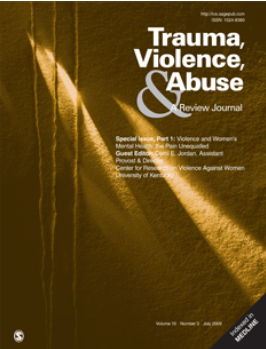父母不良童年经历与后代亚理想健康风险之间的关系:系统回顾和荟萃分析
IF 5.4
1区 社会学
Q1 CRIMINOLOGY & PENOLOGY
引用次数: 0
摘要
以往的综述和荟萃分析并未充分探讨特定的父母不良童年经历(ace)亚型对后代健康的影响。这项最新的系统综述和荟萃分析旨在调查父母ACE亚型与各种后代健康结局之间的关系。我们在PubMed、Web of Science、Cochrane图书馆、万方和中国国家知识基础设施等电子数据库中全面检索了1998年1月1日至2023年7月18日期间发表的中英文研究。两名独立审稿人筛选研究,提取数据,并使用纽卡斯尔-渥太华量表评估研究质量。采用随机效应模型生成合并优势比(or)和95%置信区间(95% CI)。最终分析共纳入47项符合条件的研究。总体而言,父母不良经历与几个后代的健康结果显著相关,包括早产(PTB)、低出生体重(LBW)、总体发育迟缓、社会情绪问题和行为问题(总体、外化和内化行为),其or范围为1.06至3.02。父母ace的特定亚型,如家庭功能障碍、性虐待和身体虐待(但不包括精神虐待)与PTB显著相关。家庭功能障碍与后代认知能力的延迟有着显著的联系。除家庭功能障碍外,父母性虐待、身体虐待、情绪虐待和情绪忽视与社会情绪问题显著相关。在总体行为问题中,父母家庭功能障碍、身体虐待、情感虐待、身体忽视和同伴欺凌与儿童行为问题均显著相关,但情感忽视与儿童行为问题显著相关。父母家庭功能障碍、性虐待、身体虐待、情绪虐待、情绪忽视、身体忽视、同伴欺凌、邻里逆境与儿童外化行为问题存在正相关。这些发现强调了父母ace对儿童多种不良健康结局的显著影响,特定的父母ace亚型发挥着独特的作用。这突出了理解不同ACE亚型的代际影响的重要性,并强调了干预措施解决这些问题的紧迫性。本文章由计算机程序翻译,如有差异,请以英文原文为准。
Association Between Parental Adverse Childhood Experiences and Offspring’s Risk of Suboptimal Health: A Systematic Review and Meta-Analysis
Previous reviews and meta-analysis have not adequately explored the impact of specific parental adverse childhood experiences (ACEs) subtypes on offspring’s health. This updated systematic review and meta-analysis aimed to investigate the association between parental ACE subtypes and various offspring health outcomes. A comprehensive search was conducted in electronic databases including PubMed, Web of Science, the Cochrane Library, WANFANG, and China National Knowledge Infrastructure for studies published in English and Chinese from January 1, 1998, until July 18, 2023. Two independent reviewers screened studies, extracted data, and assessed study quality using the Newcastle-Ottawa Scale. A random-effects model was applied to generate pooled odds ratios (ORs) and 95% confidence interval (95% CI). A total of 47 eligible studies were included in the final analysis. Overall, parental ACEs were significantly associated with several offspring’s health outcomes, including preterm birth (PTB), low birth weight (LBW), total developmental delay, social-emotional problems, and behavioral problems (total, externalizing and internalizing behaviors), with ORs ranging from 1.06 to 3.02. Specific subtypes of parental ACEs, such as household dysfunction, sexual abuse, and physical abuse (but not emotional abuse) were significantly associated with PTB. Household dysfunction was notably linked to delayed cognition ability in offspring. Parental sexual abuse, physical abuse, emotional abuse, and emotional neglect were significantly correlated with social-emotion problems, with the expception of household dysfunction. Regarding total behavioral problems, parental household dysfunction, physical abuse, emotional abuse, physical neglect, and peer bullying were all significantly associated with children’s behavioral issues, except for emotional neglect. There is a positive correlation between parental household dysfunction, sexual abuse, physical abuse, emotional abuse, emotional neglect, physical neglect, peer bullying, and neighborhood-related adversity and their children’s externalizing behavior problems. These findings underscore the significant impacts of parental ACEs on multiple adverse health outcomes in children, with specific parental ACEs subtypes exerting unique effects. This highlight the significance of comprehending the intergenerational effects of different ACE subtypes, and emphasizes the urgency of interventions to address these issues.
求助全文
通过发布文献求助,成功后即可免费获取论文全文。
去求助
来源期刊

Trauma Violence & Abuse
Multiple-
CiteScore
13.60
自引率
7.80%
发文量
131
期刊介绍:
Trauma, Violence, & Abuse is devoted to organizing, synthesizing, and expanding knowledge on all force of trauma, abuse, and violence. This peer-reviewed journal is practitioner oriented and will publish only reviews of research, conceptual or theoretical articles, and law review articles. Trauma, Violence, & Abuse is dedicated to professionals and advanced students in clinical training who work with any form of trauma, abuse, and violence. It is intended to compile knowledge that clearly affects practice, policy, and research.
 求助内容:
求助内容: 应助结果提醒方式:
应助结果提醒方式:


